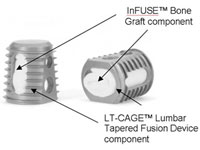
After more than 5 months of haggling, a confidential Medtronic (NYSE:MDT) witness is still staunchly refusing to produce documents in a shareholder’s lawsuit accusing the company of using off-label promotion for its troubled Infuse bone growth protein to inflate share value.
The witness, known only as Confidential Witness 2 or CW2, was subpoenaed in August 2011 to produce 8 Medtronic documents regarding "spine fusion technique," "technical training," "bone graft technique," "clinical studies" and "bone graft products," according to court documents.
CW2, who voluntarily testified on Medtronic’s behalf in this lawsuit, as well as in other Infuse-related cases, refused to hand over the papers on the grounds that they present "a
real and appreciable danger of self-incrimination."
Judge Paul Magnuson of the U.S. District Court for Minnesota this week upheld a lower court’s order that CW2 must disclose the documents.
The shareholders’ suit alleges that "Medtronic and its stable of highly paid doctor-consultants recklessly downplayed the safety risks of Infuse – especially in off-label procedures – and that Medtronic’s improper off-label marketing and revenue growth were directly tied to a troubling and financially dangerous rise in safety concerns linked to Infuse, including ‘potentially serious, and even deadly, adverse events, particularly in the cervical spine,’" according to court documents.
The plaintiffs accused Medtronic of giving doctors literature regarding off-label uses for Infuse and of advising doctors on specific amounts to use in off-label ways, as well as using off-label sales as a primary measure of sales and projections of sales, according to court documents.
The plaintiffs, led by the Minneapolis Firefighter’s Relief Assn., accuse the company, former CEOs Bill Hawkins and Arthur Collins Jr. and CFO Gary Ellis of making "materially false and misleading statements and omissions concerning the sale, promotion, and marketing" of Infuse, according to legal filings.
Medtronic is weathering a spate of lawsuits over the product after a Spine Journal issue last summer revealed serious concerns about its safety.
In June, the journal took the unprecedented step of devoting an entire issue to re-examining company-sponsored studies of Infuse. Its investigation found problems with 13 studies by MDT-sponsored physicians, all of which downplayed or omitted the rates of adverse events associated with the protein, known as recombinant human bone morphogenetic protein-2.
Although the furor ignited by the study eventually died down on Wall Street (where analysts warned of a possible 3-cent-per-share dip in overall profits), Medtronic and Infuse are under intense scrutiny elsewhere. The U.S. Justice Dept. and the U.S. Senate are each conducting probes into the bone morphogenetic compound and the Fridley, Minn.-based maker’s marketing practices. Personal injury lawsuits are also beginning to mount for Medtronic over the implant.

